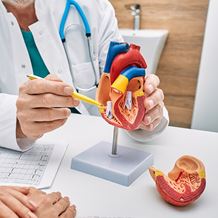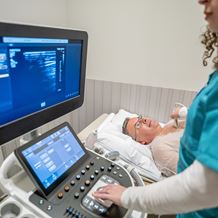What is arrhythmia?
An arrythmia simply refers to an irregular or abnormal heartbeat, whereby your heart is not keeping to its usual rhythm. Normally, your heart generates regular electrical signals that make sure it beats in an organised pattern as it pumps blood around your body. An arrythmia occurs when a fault in that system causes your heart to behave differently. This might mean it’s beating too fast (tachycardia) or too slow (bradycardia), skipping some beats or adding a few extra. Heart palpitations are not always serious but can be an indication of arrythmia that may be related to an underlying heart condition. There are different types of arrhythmias, and they are generally categorised by where they occur in the heart and the effect that they have. Supraventricular arrhythmias begin in the upper chambers of the heart, whereas ventricular arrythmias begin in the lower chambers. The most common type of arrythmia is Atrial Fibrillation, indicated by an irregular and often rapid heartbeat.
Symptoms and causes
Arrythmias do not always have noticeable symptoms and may only come to light during a standard health check. The condition occurs when there is a fault with how the heart operates. It can be caused by a range of factors such as high blood pressure, extreme stress, a fluid imbalance, or certain heart conditions like cardiomyopathy. Other medical conditions can also cause arrythmia such as hyperkalaemia, where the kidneys are not functioning effectively, or Wolff Parkinson White Syndrome, a rare and congenital heart condition that causes a fast heartbeat. Arrythmia symptoms generally include palpitations, fluttering, dizziness, chest pain, fatigue, and breathlessness.
How is it diagnosed?
Arrythmias are detected by taking your pulse and listening to your heart. There are special tests that can help confirm your diagnosis that may include:
Electrophysiology testing will also help find out what is causing the irregular heart rhythm, and some patients may wear an implantable device to record unusual patterns as they occur.
How is it treated?
Medication and lifestyle changes may be recommended such as avoiding alcohol, nicotine, and caffeine, and maintaining a healthy weight. Some patients may be suitable for an implantable device such as a pacemaker or defibrillator, or cardioversion treatment – whereby an electric shock is used to restore a normal pattern. In some cases, surgery may be recommended to remove any scar tissue that may have caused the arrhythmia. The treatment pathway will depend on the type of arrhythmia diagnosed. In some cases, no treatment may be necessary.

Other conditions
What's next?
If you have been experiencing heart-related symptoms, book an appointment with our cardiac services specialist today.
Our specialists in Cardiac Services
View all specialists





